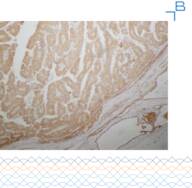
Anti-2SC antibody - 1mg/mL
Ref. 3D-CRB2005017_3
| 20µg | 534.00 € | ||
| 50µg | 721.00 € |
Product Information
- CRB2005017_6773
Succination is a stable post-translational modification of cysteine residues, which modifies protein function or turnover in response to a changing intracellular redox environment. Succination occurs when the Krebs cycle intermediate, fumarate, reacts with cysteine yielding S-(2-succino)cysteine (2SC). A wide range of proteins are subject to succination, including enzymes, adipokines, cytoskeletal proteins and ER chaperones and succination has been shown to have roles in regulatory biology. An increase in succination of adipocyte proteins is seen in diabetes mellitus and results from nutrient excess derived mitochondrial stress. 2SC therefore serves as a biomarker of mitochondrial stress or dysfunction in chronic diseases, such as obesity, diabetes, and cancer.
1mg/ml TEA eluate
Used for: WB (1:200), ELISA (I:1000), IHC (1:2000)
IHC image provided courtesy of Prof. Anthony Gill: Photomicrographs demonstrating positive cytoplasmic staining for 2SC in a fumarate hydratase deficient (HLRCC related) renal carcinoma. Antigen Retrieval on FFPE tissue: heat-induced epitope retrieval (HIER) for 30 min at 97°C in the manufacturer's alkaline retrieval solution ER2 (VBS part no: AR9640) on the Leica BondMax Autostainer. Anti-2SC antibody 6773.
Chemical properties
Technical inquiry about: 3D-CRB2005017_3 Anti-2SC antibody - 1mg/mL
If you want to request a quotation or place an order, please instead add the desired products to your cart and then request a quotation or order from the cart. It is faster, cheaper, and you will be able to benefit from the available discounts and other advantages.





